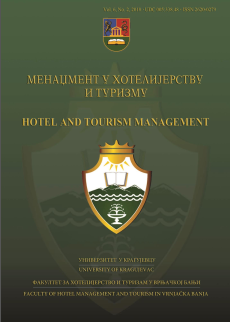Significance of quality in the tourism industry: Research study on the perception of stakeholders in tourism
Significance of quality in the tourism industry: Research study on the perception of stakeholders in tourism
Author(s): Dailbor RedžićSubject(s): Tourism
Published by: Факултет за хотелијерство и туризам у Врњачкој Бањи
Keywords: quality; hotel guests; services; hotel managers; tourism and hospitality;
Summary/Abstract: Quality in the tourism and hospitality industry presupposes the consistent delivery of products and guest services being in line with expected standards. One of the key challenges that managers in the hospitality industry face today is to provide quality services which are one of the basic conditions for realization of business goals in the global tourism market. Today, there are various tools and mechanisms which greatly facilitate the identification of quality in the tourism and hospitality industry. In order to increase the quality to a higher level, managers should identify, monitor, and weigh the impacts of costs and its activities directed towards the continuous improvement of the quality of all business operations of the company. The present study shows that hotel guests prefer quality service experience as delivered value for their money, comfortable accommodation with beautiful views, communicative and friendly staff, as well as varied and delicious foods. Moreover, the survey shows that there are numerous opportunities for further improvements in the quality of the services in the hospitality industry. Other results of the survey indicate that the key elements for successful performance of hotel companies in the future are guest satisfaction, their loyalty and word of mouth advertising. The outcomes of the survey suggest that hotel companies, in order to build excellence and profitability, should particularly focus on the quality of services, retention of existing and attracting new guests, continuous control and quality improvement, selection, training and motivation of their employees, search for best practices through benchmarking and quality accreditation through ISO or EFQM schemes.
Journal: Менаџмент у хотелијерству и туризму
- Issue Year: 6/2018
- Issue No: 2
- Page Range: 11-20
- Page Count: 10
- Language: English

